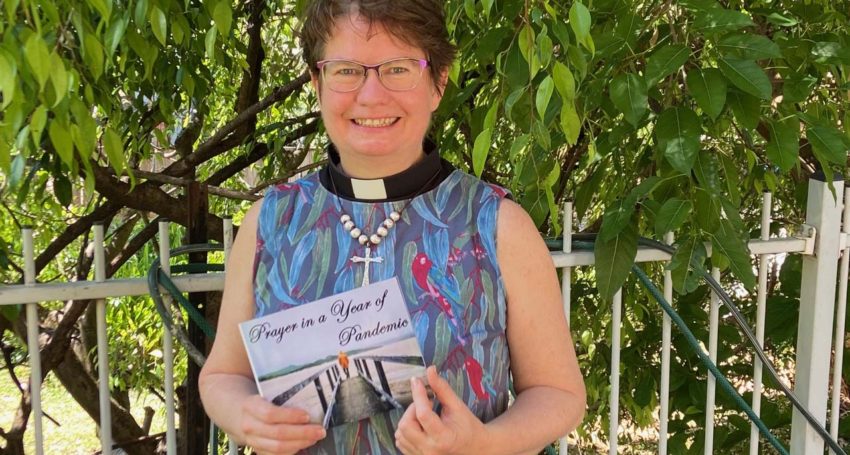How to write prayers of intercession
Features
“The word ‘intercession’ takes my mind back to those moments in the wilderness when Moses stood between God and God’s people and begged for mercy. When we lead our congregations in intercession, we stand in the space between God’s love and the congregation’s need, and we build a bridge there with our words,” says The Rev’d Dr Margaret Wesley from St Paul’s, Ithaca-Ashgrove

I grew up in a small denomination where written prayers were thought to restrict the Holy Spirit. Intercessions were, therefore, long and rambling. I was irreverent enough to time them one Sunday – they took over 20 minutes!
When I moved to the city for university, I joined an Anglican church and fell in love with the beauty and brevity of A Prayer Book for Australia (APBA) prayers. I joined the intercession roster and began to model my public intercessions on those beautiful prayers from our tradition.
Advertisement
“Intercession” is a word from the Latin for “between” and “go”. An intercessor is a go-between: someone who holds one hand towards the love, grace and power of God, and the other towards the suffering, brokenness and beauty of all creation. The word “intercession” takes my mind back to those moments in the wilderness when Moses stood between God and God’s people and begged for mercy. When we lead our congregations in intercession, we stand in the space between God’s love and the congregation’s need, and we build a bridge there with our words.
Without that bridge of intercession, a congregation can be left without hope. In August, when we were all devastated by images from Afghanistan, I heard many people cry from their hearts, “I wish there was something I could do!” There is always something we can do. Like many churches, St Paul’s organised a vigil where we could stand in that go-between space. We wept with the people of Afghanistan, named and protested their mistreatment, and remembered together that God has always loved and rescued just such vulnerable, oppressed people.
Advertisement
My children used to tease me that the only time I ever read the news was when I was rostered on for intercessions at church. Life is overwhelmingly busy sometimes, yet the holy space we inhabit when we lead a congregation in intercession makes it just as important to immerse ourselves in the needs of our world, community and congregation as it is to name and appeal to the character of God. My kids’ teasing challenged me to stand in that place of intercession every day, not just once a month when I was on the roster.
I hope the following ideas will help you prepare your intercessions.
Top 10 tips for preparing intercessions
- Read the lectionary passages and collect (prayer of the day). What aspects of God’s character will be dwelt on through the service? Focus on these in your prayers.
- Call and response keeps the congregation involved. Simple is best. Use one they are familiar with, like “Lord in your mercy, hear our prayer” or use the aspect of God’s character that is your focus: for example, “Compassionate God, comfort and heal.”
- Be aware of any significance to the day or season. At least mention this, and possibly shape the whole prayer around it.
- Inform yourself about the needs of your church, community, country, and world. Include one or two concerns from each of these areas.
- Allow yourself to feel the sadness, anger and joy around you. Cry, shout or dance as appropriate (nobody needs to see this bit!). Then your prayers will come from your heart and body, as well as your head.
- Prayer is not a personal platform. Ask yourself, “Can all God’s people gathered here today say ‘Amen’ to this?” If the answer is “no”, generalise it. At election time it is not usually appropriate to pray publicly for your party to win, but you can pray for a government that will give justice to people who are poor and vulnerable.
- You needn’t start from scratch. The APBA is a valuable resource (see pages 172-217 for outlines and examples of intercessions.) Try expanding each phrase of The Lord’s Prayer, or another favourite prayer.
- Collect prayers you like so you can find language to borrow when needed.
- Read your intercessions aloud at home so you can hear how they sound.
- Read or show your intercessions to someone who can give you feedback.
For the past 18 months I have been writing and sharing prayers in response to COVID-19 and have collected them into a book. Please let me know via email to priest@stpaulsashgrove.org.au if you would like a copy for around $20.
After the challenges of these last two years, I look forward to the “Where do we go from here?” retreat on 1-5 November 2021 at Santa Teresa Spirituality Centre, where I will lead clergy in listening for where God might be calling us now.
Editor’s note 23/05/2022: The Rev’d Dr Margaret Wesley’s book can be purchased online for $20, including GST and postage. Discounts apply for bulk orders.





